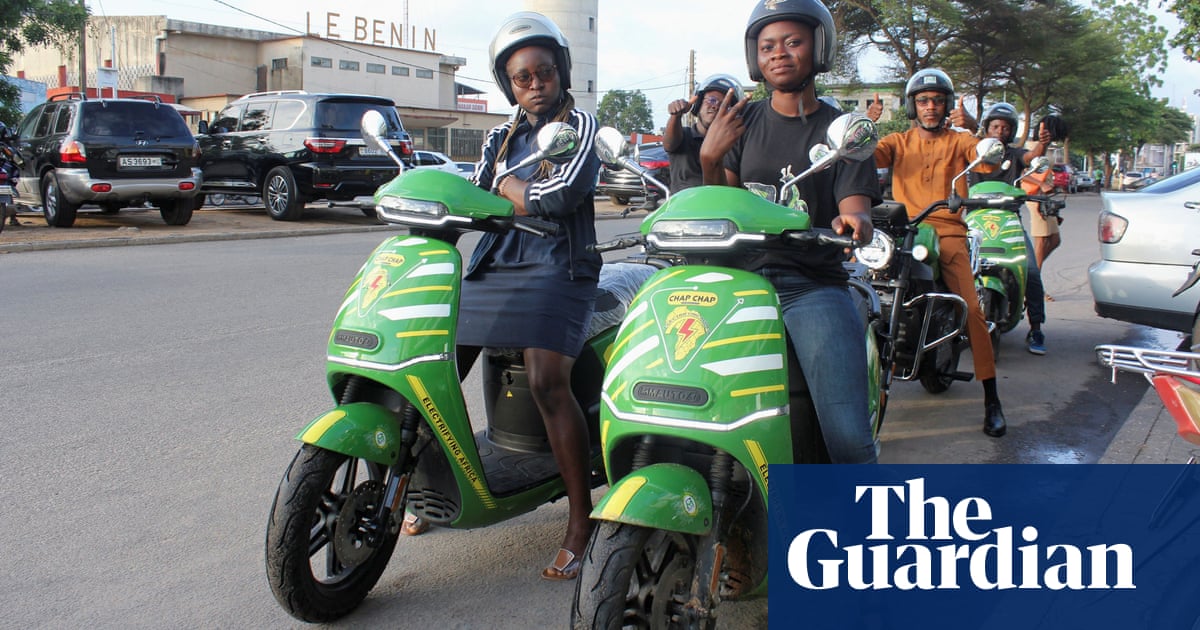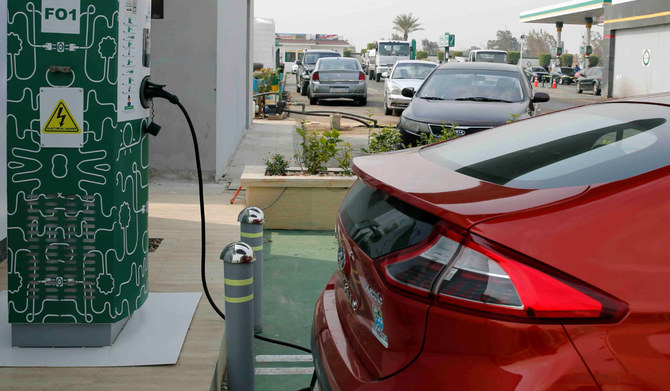
The streets of Cotonou, Benin’s largest city, have been Domingo Soule’s workplace for 35 years. The 50-year-old motorcycle taxi driver spends his days driving for miles on roads shrouded in exhaust fumes, picking up customers and taking them to where they want to go.
He is one of more than 250,000 moto-taxi drivers in the west African country, where most people use two-wheelers to get around. But Soule has developed a cough from breathing in air pollution, he believes, and at the end of each day his eyes hurt.
He says: “I’m aware that pollution brings disabilities. I’m scared for my health, but at the moment I don’t have a choice.” Like the rest of his colleagues, he relies on the money he brings home every day to survive.
Things may be about to change, however. In recent months, he’s seen more and more electric motorbikes cruising the streets of Cotonou.
The Indian manufacturer M Auto introduced its electric bikes in Benin in July 2022 and there are already 2,000 on the roads; an additional 2,000 people have paid deposits and are waiting for delivery. According to M Auto’s chief executive, Shegun Bakari, the aim is to have 25,000 in circulation by the end of the year across Benin, Togo and Rwanda. By the end of March he also wants to have a presence in Sierra Leone and Uganda.
“There is a lot of demand,” says Bakari, adding that in Benin alone there are about 100,000 new bike registrations a year. “This is something new, fancy and also affordable.”
Benin accounts for 0.6% of global CO2 emissions, of which transport in the country accounts for 65%. Greenhouse gas emissions from transportation in Africa are growing at a rate of 7% annually. Air pollution is the second biggest cause of death across the African continent, associated with non-communicable diseases including heart disease, stroke, chronic obstructive pulmonary disease and lung cancer. Approximately 1.1 million people in Africa died prematurely from air pollution-related diseases in 2019, one-sixth of the total global estimate of 7 million deaths annually.
Meanwhile, the economic cost of air pollution in African cities will increase 600% over the next 18 years unless urgent action is taken, according to projections in a recent report by Clean Air Fund.
“We have to do something about air pollution in our cities. For me it’s a duty,” says Bakari. “It’s a health issue, and people riding moto-taxis are facing a lot of pain in [that regard].”
Bakari has ambitions to get all moto-taxi drivers in Benin to convert to electric. This month he plans to launch a campaign to encourage them to swap their old bikes for new electric models.
“We are working around the figures now,” he says, “but we want to remove the [fossil fuel] bikes from the road … We are working on a complete recycling process. The plastic body can be recycled. The metal parts – the engine and chassis – can be used as scrap.”
Georges Amadou (not his real name), 35, is one moto-taxi driver who has already bought an electric motorbike. He is on a daily payment plan to cover the cost, and thinks his new bike will work out cheaper in the long term. “I’m impressed that there isn’t any maintenance to do, like changing the oil,” he says. “I appreciate the bike – it’s comfortable and it’s quiet.”
The only sticking point is the battery, Amadou adds. M Auto’s business model relies on “swap stations” throughout the city. When the battery runs out after about 60 miles (100kms), drivers must visit a station and pay to exchange the empty battery for a full one. “I’d like it if the battery had a longer life,” he says. “There isn’t a charging point near my home, so I have to travel. And if I want to go out of the city it’s a bit limiting because there aren’t many swap stations.”
Concerns about the battery are also preventing Soule from buying an electric bike. He thinks they are attractive and would help reduce the air pollution he breathes in every day, but currently they don’t make economic sense for him. It could cost him 4,000CFA (£5.40) a day to replace batteries, Soule says, whereas at the moment he can buy five litres of petrol (enough for one day) for 3,000CFA.
Bakari understands his misgivings. “No one will move to electric bikes just because you say it’s good for the planet. If it’s more expensive for them, they won’t do it,” he says. “In Benin, close to 40% of the population lives under the poverty line, earning less than US$2 a day. If I’m living with $2 a day I can’t afford to pay more just because I want to save the planet.”
He and his team are working to persuade governments in Africa to reduce taxes on electric vehicles, as well as putting plans in place to assemble the bikes in Benin. They are trying to raise money to introduce more charging points and are in talks with the government to build a solar plant to provide the extra energy that will be needed.
Time will tell if enough moto-taxi drivers will convert to electric to make a real impact in Benin but Soule says: “I am a potential customer. If the costs are lower I will buy an electric bike.”












